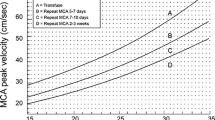Abstract
The mainstay of management of an Rh isoimmunized pregnancy is the early identification of fetal anemia. Ultrasound middle cerebral artery-peak systolic velocity (MCA-PSV) Doppler measurements are very useful to diagnose severe disease, to time delivery/serial intrauterine transfusions, and eliminate need of amniocentesis/cordocentesis. Fetal blood sampling is done if the fetus is hydropic or MCA-PSV is >1.5 MoM. Blood is kept ready for transfusion if fetal anemia is detected (hematocrit <30 %). Intravascular transfusion is preferred, especially in hydropic fetuses. Rarely, intraperitoneal transfusion is performed in certain situations when the approach to cord is difficult—posterior placenta, obesity, and very early gestation. Blood is absorbed through the lymphatics. Ultrasound and color Doppler is done for fetal heart activity, placental site, cord insertion, and accessible site. The needle path is mapped and decision is taken on where to enter the cord—cord insertion/free loop/intrahepatic portion site. A 20 gauge long needle is inserted under continuous ultrasound guidance into the umbilical vein, 2–3 mL blood aspirated for hemoglobin, packed cell volume, and blood group. Necessary volume of packed O−ve, irradiated red blood cell (hematocrit of 75–80 %) is then transfused. Fetal monitoring is done by serial ultrasound for anemia, MCA-PSV to time next transfusion, and fetal wellbeing—daily kick counts, ultrasound, and electronic biophysical profile. Neonatal management is by intensive fetal anemia and jaundice monitoring, use of intravenous immunoglobulin, exchange transfusion, and phototherapy. The improvement in outcome of Rh immunized fetuses is primarily due to improved expertise, better ultrasound machines, intrauterine blood transfusion, and improved neonatal care. From July 1997 to September 2015, there were 1022 transfusions performed in one Unit at AIIMS, with an overall successful outcome of 90–94 %. Fetal survival is low if hydropic or with first transfusion at 20 weeks or less. Care during the procedure will help to further improve safety. In conclusion, treatment of fetal anemia in Rh isoimmunization by ultrasound-guided fetal blood transfusions is relatively safe in experienced hands, permits a near-term delivery in majority of cases of this potentially life-threatening fetal disease.



Similar content being viewed by others
References
Clarke CA, Mollison PL Whitfield AG. Deaths from rhesus haemolytic disease in England and Wales in 1982 and 1983. Br Med J (Clin Res Ed). 1985;291(6487):17–9.
Rodeck CH, Kemp JR, Holman CA, Whitmore DN, Karnicki J, Austin MA. Direct intravascular fetal blood transfusion by fetoscopy in severe Rhesus isoimmunisation. Lancet. 1981;1(8221):625–7.
Rodeck CH, Nicolaides KH, Warsof SL, Fysh WJ, Gamsu HR, Kemp JR. The management of severe rhesus isoimmunization by fetoscopic intravascular transfusions. Am J Obstet Gynecol. 1984;150(6):769–74.
de Crespigny LC, Robinson HP, Quinn M, Doyle L, Ross A, Cauchi M. Ultrasound-guided fetal blood transfusion for severe rhesus isoimmunization. Obstet Gynecol. 1985;66(4):529–32.
Jacquetin B, Meyer JL, Urbain MF, Jouve P, Vanlieferingen P. Intrauterine exchange transfusion of the fetus under ultrasound guidance: first successful report. Fetal Diagn Ther. 1986;1(4):180–4.
Buckshee K, Bhatla N, Paul VK. Successful ultrasound-guided intrauterine blood transfusion in severe non-immune hydrops fetalis. Int J Gynaecol Obstet. 1990;32(2):153–6.
Dadhwal V, Deka D, Gurunath S, Mittal S, Paul VK, Deorari A. Treatment of fetal anemia in Rh isoimmunized pregnancies with intrauterine fetal blood transfusion. J Obstet Gynecol India. 2010;60(2):135–40.
Deka D, Sharma KA, Dadhwal V, Singh A, Kumar G, Vanamail P. Direct fetal intravenous immunoglobulin infusion as an adjunct to intrauterine fetal blood transfusion in rhesus-allommunized pregnancies: a pilot study. Fetal Diagn Ther. 2013;34(3):146–51.
Zimmerman R, Carpenter RJ Jr, Durig P, Mari G. Longitudinal measurement of peak systolic velocity in the fetal middle cerebral artery for monitoring pregnancies complicated by red cell alloimmunisation: a prospective multicentre trial with intention-to-treat. BJOG. 2002;109(7):746–52.
Papantoniou N, Daskalakis G, Anastasakis E, Marinopoulos S, Mesogitis S, Antsaklis A. Increasing the noninvasive management of rhesus isoimmunization. Int J Gynaecol Obstet. 2008;101(3):281–4.
Mari G. Middle cerebral artery peak systolic velocity: is it the standard of care for the diagnosis of fetal anemia? J Ultrasound Med. 2005;24(5):697–702.
Inglis SR, Lysikiewicz A, Sonnenblick AL, Streltzoff JL, Bussel JB, Chervenak FA. Advantages of larger volume, less frequent intrauterine red blood cell transfusions for maternal red cell alloimmunization. Am J Perinatol. 1996;13(1):27–33.
Radunovic N, Lockwood CJ, Alvarez M, Plecas D, Chitkara U, Berkowitz RL. The severely anemic and hydropic isoimmune fetus: changes in fetal hematocrit associated with intrauterine death. Obstet Gynecol. 1992;79(3):390–3.
Cheong YC, Goodrick J, Kyle PM, Soothill P. Management of anti-Rhesus-D antibodies in pregnancy: a review from 1994 to 1998. Fetal Diagn Ther. 2001;16(5):294–8.
van Kamp IL, Klumper FJ, Meerman RH, Oepkes D, Scherjon SA, Kanhai HH. Treatment of fetal anemia due to red-cell alloimmunization with intrauterine transfusions in the Netherlands, 1988–1999. Acta Obstet Gynecol Scand. 2004;83(8):731–7.
Mesogitis S, Daskalakis G, Pilalis A, Papantoniou N, Antsaklis A. Fetal intravascular transfusion for hydropic disease due to rhesus isoimmunization. Fetal Diagn Ther. 2005;20(5):431–6.
van Kamp IL, Klumper FJ, Oepkes D, Meerman RH, Scherjon SA, Vandenbussche FP, Kanhai HH. Complications of intrauterine intravascular transfusion for fetal anemia due to maternal red-cell alloimmunization. Am J Obstet Gynecol. 2005;192(1):171–7.
Dodd JM, Windrim RC, van Kamp IL. Techniques of intrauterine fetal transfusion for women with red-cell isoimmunisation for improving health outcomes. Cochrane Database Syst Rev. 2012;9:CD007096.
Orsini LF, Pilu G, Calderoni P, Zucchini S, Tripoli N, Pittalis MC, et al. Intravascular intrauterine transfusion for severe erythroblastosis fetalis using different techniques. Fetal Diagn Ther. 1988;3(1–2):50–9.
Craparo FJ, Bonati F, Gementi P, Nicolini U. The effects of serial intravascular transfusions in ascitic/hydropic RhD-alloimmunized fetuses. Ultrasound Obstet Gynecol. 2005;25(2):144–8.
Deka D, Dadhwal V, Sharma AK, Shende U, Agarwal S, Agarwal R, et al. Perinatal survival and procedure-related complications after intrauterine transfusion for red cell alloimmunization. Arch Gynecol Obstet. 2015 (Epub ahead of print).
Author information
Authors and Affiliations
Corresponding author
Ethics declarations
Conflict of interest
None.
Rights and permissions
About this article
Cite this article
Deka, D. Intrauterine Transfusion. J. Fetal Med. 3, 13–17 (2016). https://doi.org/10.1007/s40556-016-0072-4
Received:
Accepted:
Published:
Issue Date:
DOI: https://doi.org/10.1007/s40556-016-0072-4




